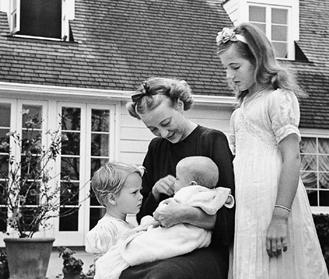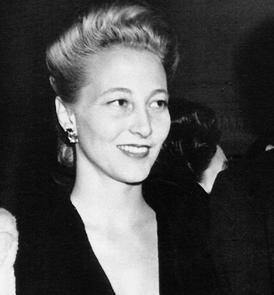Prime Time (6 page)
Authors: Jane Fonda
Tags: #Aging, #Gerontology, #Motion Picture Actors and Actresses - United States, #Social Science, #Rejuvenation, #Aging - Prevention, #Aging - Psychological Aspects, #Motion Picture Actors and Actresses, #General, #Personal Memoirs, #Jane - Health, #Self-Help, #Biography & Autobiography, #Personal Growth, #Fonda
Act II: Me with Vanessa, speaking at a rally in 1972 when I was pregnant with my son, Troy.
© VINCE COMPAGNONE
ACT III: AT THE GOLDEN GLOBES, 2011.
FRAZER HARRISON/GETTY IMAGES
Beginning a Life Review
It was the day of my fifty-ninth birthday—December 21, 1996—when it first hit me:
In one year I will turn sixty, and that will be the beginning of my last act—the final three decades of my life.
“Last”s and “final”s had not been featured in my prior vocabulary, and, frankly, as I faced the looming six-oh, I felt a knot in my stomach.
I was leaning against a hay bale in the back of a pickup truck when the realization swept over me. Four cowboys and I were heading back to headquarters after a long day rounding up bison on one of Ted Turner’s spacious ranches in southern New Mexico. Dear reader, I know this is not the first time something in my life has sounded like a scene from a bad western movie script! But that’s how it was.
Me rounding up bison on one of Ted Turner’s ranches in southern New Mexico.
© ANNIE LEIBOVITZ/CONTACT PRESS IMAGES
As we drove across the top of a high mesa, the vast, lunar landscape extended as far as I could see—endless, flat mesas, volcanic rimrock, steep canyons where exposed geologic strata gave evidence of upheavals and ancient oceans, created perhaps during Paleolithic times. Surrounded on all sides by stark reminders of the earth’s fourteen-billion-year existence, I felt the issue of time—the inexorability of it—pressing in on me. Okay, I know that in the grand scheme of things, three decades are negligible, but this was
my
life. Those three decades to come were
my
decades. What had I done with all the time—the almost six decades—now past? What did I want to do with my remaining time? How could I make the most of these coming years?
In the theater, the Third Act is when everything that has happened in Acts I and II must pay off if the play is to be memorable. “Maybe life is like that,” I thought. Maybe, in order to know how to have a good Third Act, I needed to look back at Acts I and II—to do what is called a life review. Maybe in order to answer my own questions, I would have to figure out what my first two acts had been about.
I knew I had to clear a path to my future by clarifying the road from my past until now. As I said in my memoirs,
My Life So Far,
I didn’t want to be like Christopher Columbus, who didn’t know where he was headed when he left, didn’t know where he was when he got there, and didn’t know where he’d been when he got back.
As we drove past walls of exposed rock, I saw how the stratifications revealed events, layered one on top of another over long periods of time. Just like life. Experiences are laid down, and for a while, the most recent one is the top, the plateau, the ground on which you walk. But then newer experiences occur and new layers are put down, changing the size and color and slope of what came before.
By the time the cowboys and I had arrived back at ranch headquarters, I had made up my mind that I would spend my fifty-ninth year excavating my life—examining the strata of my years.
I had also decided to make a short video based on my research that I might show, if it was good enough, to guests at my sixtieth-birthday party a year hence. This would give me a concrete narrative project with a deadline that I would have to meet. Maybe from the vantage point of fifty-nine, after surveying, observing, and reflecting upon the events and people of my past, I might gain a new understanding of them. And a new understanding might lead me, loins girded, into a successful last act.
I had a lot of experiences to learn from. We all do. There is a very human tendency to deny the failures and tragedies in our lives, but these are the very things that sometimes deliver us to ourselves—if we can learn from them.
I have known failures of all kinds: career failures, wrong paths taken, time wasted, relationships spoiled—the bumps along the searches and meanders of my life. Those failures that I ran from taught me nothing. Those that I confronted, cozied up to, and understood were the ones that permitted me quantum leaps forward. In another way of looking at it, they became the compost from which new growth emerged.
There are usually no rewards without a price. You can’t learn much that is new by playing it safe. Someone once said to me, “God doesn’t look for awards and medals, God looks for wounds. God enters us through our wounds.” I decided I would look at my wounds, see what they could teach me, let them help me set my compass and rechart a course for the time that remained. What I had to continually bear in mind—and heart and body—was the knowledge that life isn’t a dress rehearsal.
This is it.
I may have conceived of life in acts, but this coming period wasn’t an act! I had to try to get it right.
I saw some things that I needed to work on in this Third Act: my sense of fun and humor; my capacity for intimacy. I knew I didn’t want to die without succeeding in an intimate relationship with a man. I realized that I might have chosen the partners I did in Act II because they, like me, were challenged in the intimacy department.
I saw what I wanted to do in Act III: keep myself as fit and healthy as I could; repair the breaches with those I felt I should be closer to; learn to avoid stress and be more patient; lead with a loving heart; and stay useful and engaged with issues that matter the most to me, such as helping adolescents see a bright future for themselves and ending violence against women and girls.
I saw what I wanted to stop doing: judging people who disagree with me; being impatient.
What would you say about yourself? What do you want to have as goals for your life? What do you want it all to add up to?
A Life Review
When I first began excavating my life, I found myself reviewing events as someone perched on the outside, chronicling what had happened: I did this; then I did that. It helped me get started, but before long I felt it to be an empty exercise. The power of the memory of my experiences was muted by my focusing solely on the fact that they had happened. I was on the outside looking in, as if I were watching a movie.
What I needed to do was to go inside my experiences, to delve deeper—to try to recapture them more fully by bringing myself back into how that little girl and then that adolescent had felt back then. This involved active remembering—that is to say, remembering not just in my head but also in my body. I needed to envision my experiences and bring the accompanying emotions back into my body—which, if we really think about it, is where these memories and feelings existed most pungently and where they exist still; memories reside not only in our linear minds but also in our bodies, our cells, our tissues, and our senses.
My Life Review
Here are some examples of what my life review was like, at pivotal points along the way. Maybe this will help you think about how to get started on your own life review.
FIRST MEMORIES
I was two years old when my brother was born. My first memory is of my father coming back from the hospital with home movies of my mother, beaming, holding Peter in her arms. Watching the film in the living room of our home in Brentwood, California, was traumatic for me, at two. While going through a box of old letters I had saved but never revisited, I found a handwritten one from my maternal grandmother that read, “I shall never forget your reaction to seeing Peter in your mother’s arms. The tears streamed down your cheeks but you didn’t cry out loud.”
I went through an album I have of my baby pictures, and I could find none of me in Mother’s arms. Only nurses with masks over their lower faces held me for Dad’s camera. I wrote about this in
My Life So Far—
powerful memories have a way of lingering. Mother had wanted a boy and must have been disappointed when I came along sans penis. I must have sensed her disappointment, the way babies can sense things. So when I saw the images of Peter in Mother’s arms, I think I felt I’d lost her to him.
As I thought about this in my life review, I began to grasp where my fear of intimacy may have originated, and to realize that I didn’t have in either parent a person comfortable with emotional closeness. I could choose to blame my parents and make that my life narrative, or I could try to understand why they were that way, feel empathy for them, and set my sights on charting a different course for myself.
I began putting other pieces of the puzzle of myself together, like a detective. I discovered that my mother had suffered from postpartum depression when Peter was born. Nothing was known about postpartum blues back then. This partly explained her two-month absence from home following Peter’s birth.
It had nothing to do with me.
Facts. Facts. But underneath the facts were the feelings, and I began to access those when I took myself back into the little two-year-old girl sitting on the floor next to the 16mm projector, watching home movies of her mother and baby brother. I could hear again the whirring sound of the projector. I refelt my painful feelings of abandonment.
Masked nurses held me and gave me a bottle while Dad took pictures.
I’m not so sure about the new arrival, my brother Peter, here in Mother’s lap with my half-sister, Frances, looking on.




